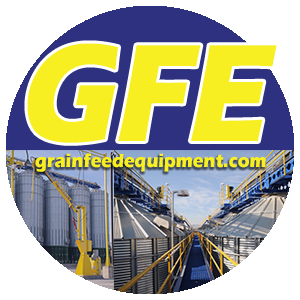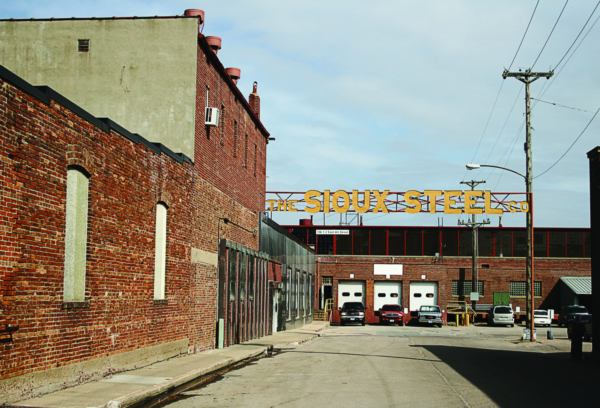Is there an advantage to being a 100+-year-old company led by the great-grandson of its founder?
Fourth generation Sioux Steel Co. CEO and part owner Scott Rysdon thinks so, saying: “The industries we serve, including farm families, often have multiple generations involved, so we share a lot of common goals and concerns. We understand our customers’ emphasis on efficiency, quality, and service, which makes for a good relationship.
“We aren’t a big entity, so we can build special connections with our customers, from the president level to the person at the front dock. We want customers to be delighted to do business with us, so we make sure they receive outstanding service, along with high-quality products.”
Looking ahead, the company is likely to stay in the family, as several members of the next generation are interested and working in the business.
“Although my sister and brother don’t work at Sioux Steel, we all are part owners and have children working here part- time or more,” says Scott. “We have a policy that allows them to come into the business early on to explore opportunities, so we hope it stays in the family.”
Four Generations
Charles Rysdon founded Sioux Steel Company in 1918 in Sioux Falls, SD, to supply furnace ductwork for homes and offices in the area. Charles’ son, Max Rysdon, was 15 at the time and his first summer job was as a water boy for the factory.
After college, Max joined Sioux Steel as sales manager and purchasing agent taking over as president in 1940. Under his leadership, the company expanded beyond adjacent states and began making additional farm equipment.
Max’s 14-year-old son, Phil Rysdon, started working summers at the plant in 1951. After college, Phil worked in sales, before quickly moving into advertising and marketing. In the 1980s, Phil took over as president leading the company through some difficult years due to high interest rates and poor crops.
In 1981, Phil’s son, Scott Rysdon, started working in the tank department. After college and working for three years in a management position outside the company, Scott joined Sioux Steel in 1991 as project manager and later became sales manager. In 2005, Scott took over as CEO, while Phil continues as president and chairman of the board of directors.
“Dad is here every day, supporting the company with his wisdom,” says Scott. “My job is to oversee day-to-day operations and guide strategic planning.”
When asked how the business has survived for 95 years and through four generations, Scott replies:
“First, we have a solid understanding of good business principles that each generation has passed down to the next. We don’t drive Ferraris.
“Second is our differentiation of product lines used in a variety of industries, which really helps when one area may be down, but another is up.
“Third is our continual emphasis on improving, with every single customer. We encourage an attitude of innovation that allows us to produce solutions to problems for customers that they don’t even know exist. A lot of companies our age don’t continue to improve, but we understand that you can’t take things for granted. You must always strive to be the best.”
Brief Company History
Founded in Sioux Falls in a small horse barn with an adjacent wagon repair area, the company made furnace ductwork. In the late 1920s, Sioux Steel also started selling furnaces, wall and floor registers, and oil storage tanks.
In 1929, the company began manufacturing grain storage bins and other farm equipment. To accommodate this growth, two new additions were made to the facility. By the late 1950s, additional plant space was added to expand the receiving and warehouse areas.
In 1967, Sioux Steel purchased Koyker Manufacturing Company, an auger manufacturer located in Hull, IA. Soon after, the Koyker product line was expanded to add a line of front-end tractor loaders and grain cleaners. With continued growth in sales, an additional manufacturing facility was built in Lennox, SD in 1977.
In the 1980s, a downturn in farm business led Sioux Steel to close its Hull facility and relocate all of its Koyker product lines to the Lennox plant.
Since then, three additional facilities have been added within the Lennox Industrial Park. In 2002, a new paint, powder-coat, and weld facility was built to house Sioux Steel’s Livestock Division, which started in the late 1960s. In 2008, a Fusion Plastic Division was opened in which to make rotational molded plastics for agricultural and other customers. Then in 2007, a fourth facility in Lennox was opened to house the Pro•Tec Buildings Division, which engineers and manufactures fabric buildings used for everything from grain storage to confinement cattle feeding.
“Today, we have approximately 335 employees working from our five manufacturing facilities – a large one in Sioux Falls and four others located just 26 miles away in Lennox comprising a total of approximately 350,000 square feet under roof,” says Scott. “They all fall under the umbrella of Sioux Steel Company and support each other and purchase from each other, but each division has its own discipline and specialty.
“This structure allows each division to focus on its area of expertise. It makes for an incredibly diverse platform under which to operate. The agricultural community has rewarded our diversity by purchasing products in each division. Customers see our division names, and it is our belief that customers buy based on specific product brands.”
“Back in 1929, we were one of the first companies in the world to develop grain storage, when we started manufacturing corn cribs,” says Scott. “Over the years, we’ve continually expanded and changed our product lines to meet market needs including developing commercial storage vessels in the mid-1980s. Although we stopped making corn cribs in the 1970s, we’ve continually developed new storage products with increased safety features, and grain bins are still our most important product line.
“As farmers used the latest technology to increase grain production, we needed to redefine commercial grain storage. Corn test weights used to be approximately 54 lb./bushel, but now they are at 60-62 lb./bushel, and other grain weights have increased, too. This has driven the demand for commercial storage vessels that can handle these increased weights, as well as allow for potential increases over the next several years.”
Pro•Tec Engineered Buildings
“Our partially-enclosed Pro•Tec Buildings are another important addition to the range of storage options because of the versatility in design and lower cost than traditional storage,” says Scott. “Flat storage allows moving the grain faster with more options, and it doesn’t require the significant foundation work needed to support bin storage.
“This is a growing segment of the market. It currently makes up approximately 10% of our business and is climbing.”
New Sweep Invention
“Our new augerless Daay Bin Paddle Sweep is an example of a great idea. This fully-submerged sweep efficiently moves the grain using flexible rubber paddles to safely and easily sweep almost all of the grain from any size bin floor. It is the safest design on the market and a great addition to our product line,” says Scott.
10-Year Bin Guarantee
“Customers want a storage facility that will last for many years, and we guarantee our farm grain bins by offering a 10-year warranty, which is the longest in the industry,” says Scott. “Our 10-year warranty shows customers that we stand behind our products. We are known for producing products that may not be the cheapest but are the most long- lasting and built to withstand the most rigorous conditions.”
Sioux Steel not only stands behind its products, but also sometimes stands under its products to demonstrate a point.
Reprinted from Grain Journal May/June 2013 Issue
Revised August 20, 2020

